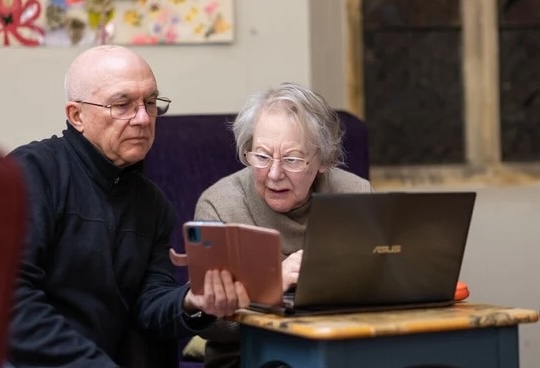Our role in the Digital Champion ecosystem and endeavour
Digital Unite’s (self-appointed, more on that later) mission is to promote digital inclusion in the service of personal, social, civic, economic, and political empowerment.
We do this by supporting public and private organisations (service providers) to start, grow, evolve and sustain in-house Digital Champions – be they staff and/or volunteers – to drive digital inclusion and essential digital skills with their customers (service users).
Our vision is a digitally inclusive society for all. We believe that Digital Champions and building DC capacity has a huge role to play in realising this.
From 1996 to about 2010, we did this in a localised, long-hand, slightly ‘command and control’ way by dropping our trainers into other people’s places to do that Champion work with their customers/service users.
There was always something a bit wonky about this, though personally I learned a lot from it and so did the business.
Essentially, it was hard to scale that model: operationally it felt complicated and costly. Reflecting on that I think that today, with the advances in AI in particular, you’d be looking at developing a very different shaped business if you wanted an army of digital inclusion agents on the ground. But back in the day, that operational challenge was probably the fork in the road for me strategically and I’m grateful for it because it’s brought a great evolutionary richness. Not without challenge but nothing goes in a straight line.
I’m certainly not knocking that model wholesale either as a way of working. People like Matt Adams and Gori Yaya have their digital training tribes, for example, and they do that very well. It’s just not for me.
Added to which, I’ve probably always been bee like. Something about the hive and the collective endeavour kept buzzing in my ear: Wouldn’t it just be better all round if you, dear client, built this Digital Champion capacity for yourselves on your own terms? Wouldn’t we be happier, and more streamlined, if we focussed our efforts on supporting you, dear client, not to reinvent the wheel? Not to have to design a set of standards and competencies, monitoring and support methodologies around the role that you probably can’t do as well as we can - because you are first and foremost a brilliant charity/ council/ social housing provider? Mr Gove (in)famously didn’t approve of experts, and look what happened to him.
